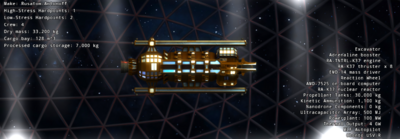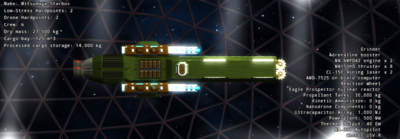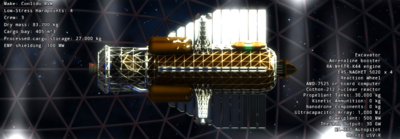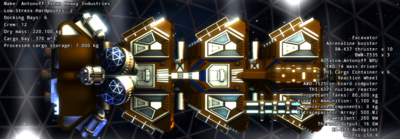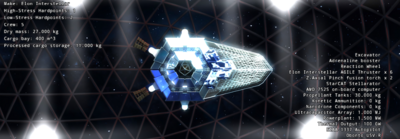(created page, disliked having to use the "category" prefix every time) Tags: New redirect Visual edit |
m (Updated from Elon to Eon) |
||
| (5 intermediate revisions by 2 users not shown) | |||
| Line 1: | Line 1: | ||
# | There is a variety of ships available for ownership in the Rings. Prices at the [[Enceladus Prime's Menus#Dealer|dealer]] may vary, depending on installed equipment, damage and age. (Note: salvage vessels and military craft are not available to the civilian market.) | ||
'''NOTE''': This page provides only short descriptions to each line of ships. To see their full potential, please check out each ship's page directly, or compare raw stats on the [[:Category:Ships]] page. | |||
== Civilian Ships == | |||
See also: [[List of ship variants]] | |||
=== [[K37|K37 TNTRL]] === | |||
<!-- [[File:K37-tntrl.png|300px|right]] --> | |||
[[File:K37TNTRL.png|400px|right]] | |||
Often labeled "Workhorse of the Rings", the K37 is the most common ship between Enceladus and Saturn. Introduced in the late 22nd century, the simple and robust design has proven its worth many times over, leading to the creation of numerous variants. | |||
Manufacturer: Rusatom-Antonoff | |||
{| class="wikitable" | |||
| Length: || Dry mass: || Processed cargo: || Cargo bay: || Hardpoints: || Crew: || New price: | |||
|- | |||
| 34 m || 33 t || 42 t (7 t each) || 96 m^3 || 1 High-stress, 2 Low-stress || 4 || 365,999 E$ | |||
|} | |||
{{#invoke:Ships|variants|K37 | |||
|Name | |||
|High-Stress | |||
|Low-Stress | |||
|Crew | |||
|Dry mass | |||
|Cargo bay | |||
|Processed cargo | |||
|Stripped hull price | |||
|Variant}} | |||
=== [[Eagle Prospector]] === | |||
[[File:EagleProspector.png|400px|right]] | |||
The Eagle Prospector is a modern, dedicated mining ship. Devised in the early 23rd century, incorporating recent yet affordable technology, its sophisticated design allows it to surpass the K37 in almost every stat, and still achieve a lower dry mass. | |||
Manufacturer: Mitsudaya-Starbus | |||
{| class="wikitable" | |||
| Length: || Dry mass: || Processed cargo: || Cargo bay: || Hardpoints: || Crew: || New price: | |||
|- | |||
| 50 m || 28 t || 84 t (14 t each) || 125 m^3 || 2 Low-stress, 2 Drone mounts || 6 || 2,539,999 E$ | |||
|} | |||
{{#invoke:Ships|variants|Eagle Prospector | |||
|Name | |||
|High-Stress | |||
|Low-Stress | |||
|Drone hardpoints | |||
|Crew | |||
|Dry mass | |||
|Cargo bay | |||
|Engines | |||
|Stripped hull price | |||
|Variant}} | |||
=== [[Cothon-212]] === | |||
[[File:C212.png|400px|right]] | |||
Too useful to be dismantled, the Cothon stood the test of time. It stands out by being one of the few ships that have EMP shielding. The Cothon originally was developed in the late 21st century as interlunar cargo hauler, hence the impressive cargo space and reinforced frame with sturdy Faraday cage. The focus on automated interplanetary flights meant that besides adding a strong main engine to the mix, not much else was given attention. | |||
Many years later, resourceful ringdivers would welcome the cheap cargo space, retrofit a [[lifepod]] to serve as minimalist crew cabin – and there you have today’s Cothon-212. The ships are no longer in production, but continually change hands as yet another Cothon captain made enough profit to swap to a more comfortable ship – and the next up-and-coming miner is looking to buy a Cothon to do just the same. | |||
Manufacturer: Conlido RVM | |||
{| class="wikitable" | |||
| Length: || Dry mass: || Processed cargo: || Cargo bay: || Hardpoints: || Crew: || Stripped hull price: | |||
|- | |||
| 54 m || 84 t || 162 t (27 t each) || 260 m^3 || 4 Low-stress || 3 || 79,549 E$ | |||
|} | |||
{{#invoke:Ships|variants|Cothon-212 | |||
|Name | |||
|Dry mass | |||
|Processed cargo | |||
|Engines | |||
|EMP shielding | |||
|Stripped hull price | |||
|Variant}} | |||
=== [[OCP-209]] === | |||
[[File:OCP209.png|400px|right]] | |||
The OCP, short for Orbital Construction Platform, is a utility vessel of unusual design, specialized in extended construction or resupply missions. The entire ship is designed around a huge cylindrical cargo bay, with the center of mass exactly in the middle. This allows the OCP to transport large assemblies and components such as reactors, and also side-load and rotate around them as needed. | |||
The twin high-stress [[Hardpoint|hardpoints]] are located on the starboard side, where the bay opens. The standard loadout features two manipulator arms to assist in (un)loading or installation work. Ringdivers gladly repurpose the ship’s capabilities for salvaging, possibly retrieving two ships via ARMs (in addition to raw materials and smaller derelicts in the sizable cargo bay). | |||
The comfortable habitat works wonders for crew morale. However, the 209 cannot carry any [[Cargo Container|cargo containers]], captains are therefore limited to 50 t of processed minerals. | |||
Manufacturer: Obonto Microengineering | |||
{| class="wikitable" | |||
| Length: || Dry mass: || Processed cargo: || Cargo bay: || Hardpoints: || Crew: || Stripped hull price: | |||
|- | |||
| 85 m || 185 t || 50 t (combined) || 610 m^3 || 2 High-stress, 2 Low-stress || 8 || 217,200 E$ | |||
|} | |||
=== [[K225|K225 "Titan"]] === | |||
[[File:AT-K225.png|400px|right]] | |||
The AT-K225, commonly referred to as "Titan", is a modular design cargo carrier. The stock variant comes with 6 [[THI Cargo Container|THI Cargo Containers]] preinstalled, which increase mineral capacity by 540 tons. (The capacity below refers to the internal base storage.) | |||
This is not a ship for inexperienced captains. Titan miners will commonly swap some containers for nanodrones and point defense weapons, but even then it still becomes harder to maneuver as it fills up with ore. Last but not least, the K225 is capable of equipping the largest [[Propellant Tank|propellant]], [[Kinetic Ammunition|ammunition]], and [[Nanodrone Components|nanodrone]] storages. | |||
Manufacturer: Antonoff-Titan Heavy Industries | |||
{| class="wikitable" | |||
| Length: || Dry mass: || Processed cargo: || Cargo bay: || Hardpoints: || Crew: || New price: | |||
|- | |||
| 84 m || 220 t || 42 t (7 t each) || 280 m^3 || 2 Low-stress, 6 Docking bays || 12 || 3,999,999 E$ | |||
|} | |||
{{#invoke:Ships|variants|K225 | |||
|Name | |||
|Low-Stress | |||
|Docking bays | |||
|Dry mass | |||
|Cargo bay | |||
|Engines | |||
|EMP shielding | |||
|Stripped hull price | |||
|Variant}} | |||
=== [[Model E]] === | |||
[[File:EIME.png|400px|right]] | |||
The Model E is an extraordinary ship. The price tag reflects that, but how could it not when this is the first commercial vessel with a fusion reactor. Those who get to pilot one, tend to confirm that the Stellarator and Z-Pinch indeed deliver on the marketing claims of "unparalleled performance". Still, the general notion is the [[HUD]] and semi-autonomous [[autopilot]] are hard to get used to, as are the cargo doors and [[MPU]] placement. | |||
The stock loadout includes entirely [[Main Propulsion|gimbaled engines]] and [[RCS]]. Despite all the technical marvel, it’s still a ship, and if you fly her into a rock, she will need repairs. Just be prepared that with a Model E, the repair bill will be equally unparalleled, ground-breaking and stellar. | |||
Manufacturer: Eon Interstellar | |||
{| class="wikitable" | |||
| Length: || Dry mass: || Processed cargo: || Cargo bay: || Hardpoints: || Crew: || New price: | |||
|- | |||
| 39 m || 27 t || 66 t (11 t each) || 140 m^3 || 1 High-stress, 2 Low-stress || 5 || 8,999,999 E$ | |||
|} | |||
=== [[ND-LIS Kitsune]] === | |||
[[File:ND-LIS Kitsune STATS.png|400px|right]] | |||
Kitsune are small ex-military shuttlecraft, decommissioned for civilian use. They were designed for short-range hauls and, due to their low hull mass, can operate without a main engine. Another unusual feature is the extendable cargo bay. Many miners use them for pilot training, quick trading runs with Obonto habitats, and racing among many other things. | |||
Manufacturer: Nakamura Dynamics | |||
{| class="wikitable" | |||
| Length: || Dry mass: || Processed cargo: || Cargo bay: || Hardpoints: || Crew: || Stripped hull price: | |||
|- | |||
| 13 m || 4 t || 18 t (combined) || 40-75 m^3 || 1 Low-stress || 3 || 14,999 E$ | |||
|} | |||
== Non-Civilian Ships == | |||
;[[MAD-CERF]] | |||
: A ship designed specifically for SAR (search and rescue) and salvage operations. Built to recover stranded or abandoned vessels, it's large enough to fit most ships within it. | |||
;[[Big Bad Wolf|Tsukuyuomi-Class Frigate]] | |||
: In the late 22nd century, the light tactical frigate with NSWR propulsion was a novelty, and state of the art. Today however, the enormous waste heat of its main drive make it obsolete on the modern battlefield. Nevertheless, it is rumored that Vilcy still operate one, and given their influence and ex-military background, a viable possibility. | |||
: Dry mass: 1,300 t | |||
See also: [[:Category:Ships]] | |||
{{Ships}} | |||
Latest revision as of 04:29, 11 October 2025
There is a variety of ships available for ownership in the Rings. Prices at the dealer may vary, depending on installed equipment, damage and age. (Note: salvage vessels and military craft are not available to the civilian market.)
NOTE: This page provides only short descriptions to each line of ships. To see their full potential, please check out each ship's page directly, or compare raw stats on the Category:Ships page.
Civilian Ships
See also: List of ship variants
K37 TNTRL
Often labeled "Workhorse of the Rings", the K37 is the most common ship between Enceladus and Saturn. Introduced in the late 22nd century, the simple and robust design has proven its worth many times over, leading to the creation of numerous variants.
Manufacturer: Rusatom-Antonoff
| Length: | Dry mass: | Processed cargo: | Cargo bay: | Hardpoints: | Crew: | New price: |
| 34 m | 33 t | 42 t (7 t each) | 96 m^3 | 1 High-stress, 2 Low-stress | 4 | 365,999 E$ |
| Name | High-Stress | Low-Stress | Crew | Dry mass | Cargo bay | Processed cargo | Stripped hull price | Variant |
|---|---|---|---|---|---|---|---|---|
| K37 TNTRL | 1 | 2 | 4 | 33,200 kg | 96 m^3 | 7,000 kg | 88,949 E$ | |
| KTA24 TNTRL | 1 | 2 | 4 | 27,970 kg | 58 m^3 | 3,000 kg | 87,853 E$ | Tug with angled reverse thrust |
| KX37 TNTRL | 1 | 2 | 4 | 37,970 kg | 110 m^3 | 10,000 kg | 140,249 E$ | Extended cargo hold |
| Runasimi KR37 TNTRL | 1 | 2 | 6 | 47,500 kg | 100 m^3 | 4,000 kg | 207,299 E$ | EMP shielded |
| K44 MHFTR Prototype | 0 | 4 | 4 | 54,600 kg | 136 m^3 | 14,000 kg | 523,200 E$ | Abandoned prototype |
Eagle Prospector
The Eagle Prospector is a modern, dedicated mining ship. Devised in the early 23rd century, incorporating recent yet affordable technology, its sophisticated design allows it to surpass the K37 in almost every stat, and still achieve a lower dry mass.
Manufacturer: Mitsudaya-Starbus
| Length: | Dry mass: | Processed cargo: | Cargo bay: | Hardpoints: | Crew: | New price: |
| 50 m | 28 t | 84 t (14 t each) | 125 m^3 | 2 Low-stress, 2 Drone mounts | 6 | 2,539,999 E$ |
| Name | High-Stress | Low-Stress | Drone hardpoints | Crew | Dry mass | Cargo bay | Engines | Stripped hull price | Variant |
|---|---|---|---|---|---|---|---|---|---|
| Eagle Prospector | 0 | 2 | 2 | 6 | 27,500 kg | 125 m^3 | 2 | 184,099 E$ | |
| Bald Eagle | 0 | 2 | 2 | 6 | 29,500 kg | 40 m^3 | 4 | 297,499 E$ | Racing |
| Peacock Prospector | 0 | 2 | 2 | 4 | 27,500 kg | 125 m^3 | 2 | 297,949 E$ | Luxury interior influences crew morale towards happy |
| Vulture Prospector | 1 | 2 | 0 | 6 | 37,500 kg | 90 m^3 | 2 | 455,449 E$ | Drone hardpoints replaced with a high-stress hardpoint |
| Pelican Prospector | 0 | 2 | 2 | 6 | 62,000 kg | 240 m^3 | 2 | 860,449 E$ | Larger cargo bay, grinders replaced with excavator |
Cothon-212
Too useful to be dismantled, the Cothon stood the test of time. It stands out by being one of the few ships that have EMP shielding. The Cothon originally was developed in the late 21st century as interlunar cargo hauler, hence the impressive cargo space and reinforced frame with sturdy Faraday cage. The focus on automated interplanetary flights meant that besides adding a strong main engine to the mix, not much else was given attention.
Many years later, resourceful ringdivers would welcome the cheap cargo space, retrofit a lifepod to serve as minimalist crew cabin – and there you have today’s Cothon-212. The ships are no longer in production, but continually change hands as yet another Cothon captain made enough profit to swap to a more comfortable ship – and the next up-and-coming miner is looking to buy a Cothon to do just the same.
Manufacturer: Conlido RVM
| Length: | Dry mass: | Processed cargo: | Cargo bay: | Hardpoints: | Crew: | Stripped hull price: |
| 54 m | 84 t | 162 t (27 t each) | 260 m^3 | 4 Low-stress | 3 | 79,549 E$ |
| Name | Dry mass | Processed cargo | Engines | EMP shielding | Stripped hull price | Variant |
|---|---|---|---|---|---|---|
| Cothon-212 | 83,700 kg | 27,000 kg | 1 | 100 MJ | 79,549 E$ | |
| Cothon-213 "Triplet" | 84,700 kg | 27,000 kg | 3 | 78,149 E$ | Triple main engines | |
| Cothon-211 "Chonker" | 83,700 kg | 27,000 kg | 1 | 100 MJ | 79,549 E$ | Larger excavator |
| Cothon-217 "Bender" | 103,700 kg | 108,000 kg (combined) | 1 | 100 MJ | 102,049 E$ | Variable processed cargo storage |
OCP-209
The OCP, short for Orbital Construction Platform, is a utility vessel of unusual design, specialized in extended construction or resupply missions. The entire ship is designed around a huge cylindrical cargo bay, with the center of mass exactly in the middle. This allows the OCP to transport large assemblies and components such as reactors, and also side-load and rotate around them as needed.
The twin high-stress hardpoints are located on the starboard side, where the bay opens. The standard loadout features two manipulator arms to assist in (un)loading or installation work. Ringdivers gladly repurpose the ship’s capabilities for salvaging, possibly retrieving two ships via ARMs (in addition to raw materials and smaller derelicts in the sizable cargo bay).
The comfortable habitat works wonders for crew morale. However, the 209 cannot carry any cargo containers, captains are therefore limited to 50 t of processed minerals.
Manufacturer: Obonto Microengineering
| Length: | Dry mass: | Processed cargo: | Cargo bay: | Hardpoints: | Crew: | Stripped hull price: |
| 85 m | 185 t | 50 t (combined) | 610 m^3 | 2 High-stress, 2 Low-stress | 8 | 217,200 E$ |
K225 "Titan"
The AT-K225, commonly referred to as "Titan", is a modular design cargo carrier. The stock variant comes with 6 THI Cargo Containers preinstalled, which increase mineral capacity by 540 tons. (The capacity below refers to the internal base storage.)
This is not a ship for inexperienced captains. Titan miners will commonly swap some containers for nanodrones and point defense weapons, but even then it still becomes harder to maneuver as it fills up with ore. Last but not least, the K225 is capable of equipping the largest propellant, ammunition, and nanodrone storages.
Manufacturer: Antonoff-Titan Heavy Industries
| Length: | Dry mass: | Processed cargo: | Cargo bay: | Hardpoints: | Crew: | New price: |
| 84 m | 220 t | 42 t (7 t each) | 280 m^3 | 2 Low-stress, 6 Docking bays | 12 | 3,999,999 E$ |
| Name | Low-Stress | Docking bays | Dry mass | Cargo bay | Engines | EMP shielding | Stripped hull price | Variant |
|---|---|---|---|---|---|---|---|---|
| Antonoff-Titan K225 | 2 | 6 | 220,100 kg | 280 m^3 | 3 | 2,064,824 E$ | ||
| Antonoff-Titan K225-BB | 2 | 2 | 190,100 kg | 710 m^3 | 3 | 2,674,749 E$ | 4 docking bays removed to fit a much larger cargo bay | |
| Antonoff-Titan K225 (modified) | 2 | 0 | 250,100 kg | 280 m^3 | 9 | 100 MJ | 5,174,749 E$ | Custom research retrofit, replaced docking bays with torch fittings and a Faraday cage fitted to give EMP resistance |
Model E
The Model E is an extraordinary ship. The price tag reflects that, but how could it not when this is the first commercial vessel with a fusion reactor. Those who get to pilot one, tend to confirm that the Stellarator and Z-Pinch indeed deliver on the marketing claims of "unparalleled performance". Still, the general notion is the HUD and semi-autonomous autopilot are hard to get used to, as are the cargo doors and MPU placement.
The stock loadout includes entirely gimbaled engines and RCS. Despite all the technical marvel, it’s still a ship, and if you fly her into a rock, she will need repairs. Just be prepared that with a Model E, the repair bill will be equally unparalleled, ground-breaking and stellar.
Manufacturer: Eon Interstellar
| Length: | Dry mass: | Processed cargo: | Cargo bay: | Hardpoints: | Crew: | New price: |
| 39 m | 27 t | 66 t (11 t each) | 140 m^3 | 1 High-stress, 2 Low-stress | 5 | 8,999,999 E$ |
ND-LIS Kitsune
Kitsune are small ex-military shuttlecraft, decommissioned for civilian use. They were designed for short-range hauls and, due to their low hull mass, can operate without a main engine. Another unusual feature is the extendable cargo bay. Many miners use them for pilot training, quick trading runs with Obonto habitats, and racing among many other things.
Manufacturer: Nakamura Dynamics
| Length: | Dry mass: | Processed cargo: | Cargo bay: | Hardpoints: | Crew: | Stripped hull price: |
| 13 m | 4 t | 18 t (combined) | 40-75 m^3 | 1 Low-stress | 3 | 14,999 E$ |
Non-Civilian Ships
- MAD-CERF
- A ship designed specifically for SAR (search and rescue) and salvage operations. Built to recover stranded or abandoned vessels, it's large enough to fit most ships within it.
- Tsukuyuomi-Class Frigate
- In the late 22nd century, the light tactical frigate with NSWR propulsion was a novelty, and state of the art. Today however, the enormous waste heat of its main drive make it obsolete on the modern battlefield. Nevertheless, it is rumored that Vilcy still operate one, and given their influence and ex-military background, a viable possibility.
- Dry mass: 1,300 t
See also: Category:Ships
| K37 series | K37 TNTRL • KTA24 • KX37 • KR37 • K44 |
|---|---|
| Prospector series | Eagle Prospector • Peacock Prospector • Vulture Prospector • Pelican Prospector • Bald Eagle |
| Cothon series | Cothon-212 • 211 "Chonker" • 213 "Triplet" • 217 "Bender" |
| Antonoff-Titan series | K225 "Titan" • K225-BB "Break-bulk" • K225 (modified) |
| Other ships | OCP-209 • EIME (Model E) • ND-LIS Kitsune |
